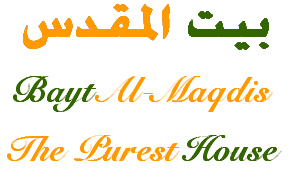

Introduction:
As Muslims we are to abide by Allah (SWT)’s rules and commands. Whatever Allah (SWT) states in Qur'an, and whatever the Prophet (SAW) commends us to follow we are required to honor, respect, and fulfill without any questioning or doubt. Based on these basic rules, I encourage every Muslim, Islamic institution, and Islamic organization in the western world to refrain, and better still, to completely stop using terms that are clearly absent from Qur'an and Sunna such as Jerusalem (or its derivatives such as east or west Jerusalem).
It is perfectly understandable for Jews or Christians to use the name Jerusalem for Bayt Al-Maqdis because their respective scriptures do refer to it as such. But for us, Muslims, to adopt the nomenclature of "Ahl Al-Kitab" is yet another sign that we are becoming once more "Qawm Tubba' = blind followers" as the Prophet (SAW) mentioned in a well known hadith of his. The following hadith explains my fear in following the ways of Ahl Al-Kitab: "Abu Sa'id Al-Khudri, may Allah be pleased with him, reported Allah's Messenger (SAW) said:
You would tread the same path as was trodden by those before you inch by inch and step by step so much that if they had entered into the hole of the lizard, you would follow them in this also. We said: Allah's Messenger, do you mean the Jews and the Christians (by your words)? He said: Who else (than those two religious groups).
Sahih Muslim [Arabic only]: 4822 ".
Using these nomenclatures is also a sign of inferiority complex and giving in to questionable claims of "Ahl Al-Kitab" to this most special place.
Islamic Nomenclatures:
The Islamic nomenclatures are explained in the paragraphs below:

"Anas bin Malik, may Allah be pleased with him, narrated:
Allah's Messenger (may peace be upon him) said: I was brought Al-Buraq which is an animal white and long, bigger than a donkey but smaller than a mule who would place his hoof at a distance equal to the range of vision. I mounted it and came to Bait Al-Maqdis, then tethered it to the ring used by the prophets. I entered the mosque and prayed two rak'ahs in it, and then came out and Gabriel brought me a vessel of wine and a vessel of milk. I chose the milk, and Gabriel said: You have chosen the thing of natural disposition. Then he took me to heaven.
…
Sahih Muslim [Arabic only]: 234"
"Abu Hurairah, may Allah be pleased with him, reported:
Allah's Messenger (may peace be upon him) said: I found myself in Hijr and the Quraish were asking me about my Night Journey. I was asked about things pertaining to Bait Al-Maqdis which I could not preserve (in my mind). I was very much vexed, so vexed as I had never been before. Then Allah raised it (Bait Al-Maqdis) before my eyes. I looked towards it, and I gave them the information about whatever they questioned me…
Hadith numeration in Sahih Muslim [Arabic only]: 251"
The name Bayt Al-Maqdis has been also the name used by various sahaba (RA) such as Omar Ibn-Al-Khattab (RA) when he entered this Purest of Cities and Salah Ed-Din Al-Ayyoubi (RahA) the last Muslim ruler and leader to liberate it from the crusaders.
Note:
"Bayt" is more preferable than "Bait" for the latter suggests
the meaning of "a lure" in the English mind.
Last Statement:
As Muslims, we should strive to preserve our identity and be proud of what Allah (SWT) bestowed upon us because of this great deen, deen Al-Islam. Bayt Al-Maqdis, dear Brothers and Sisters, is our Amana and Allah (SWT) is going to hold each one of us, Muslims, responsible for not taking special care of it. May Allah (SWT) guide us and help us maintain his words "La Ilaha Illa Allah" most high and most sublime.
Thanks:
A) Special thanks to the maintainers of The Noble Quran web site whose Qur’an sources are superb and were used in the aya selections quoted above. Jazahoom Allah Khayran! Please, support their wonderful efforts and visit them at http://www.unn.ac.uk/societies/islamic/quran/naeindex.htm.
B) Special thanks to the maintainers of Al-Islam web site whose Hadith sources were used in the ahaadeeth search and selections used in this article. Jazahoom Allah Khayran! Please, support their wonderful efforts and visit them at http://hadith.al-islam.com/Bayan/default.asp?lang=Eng.